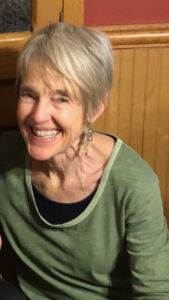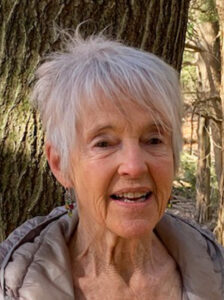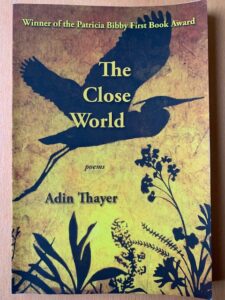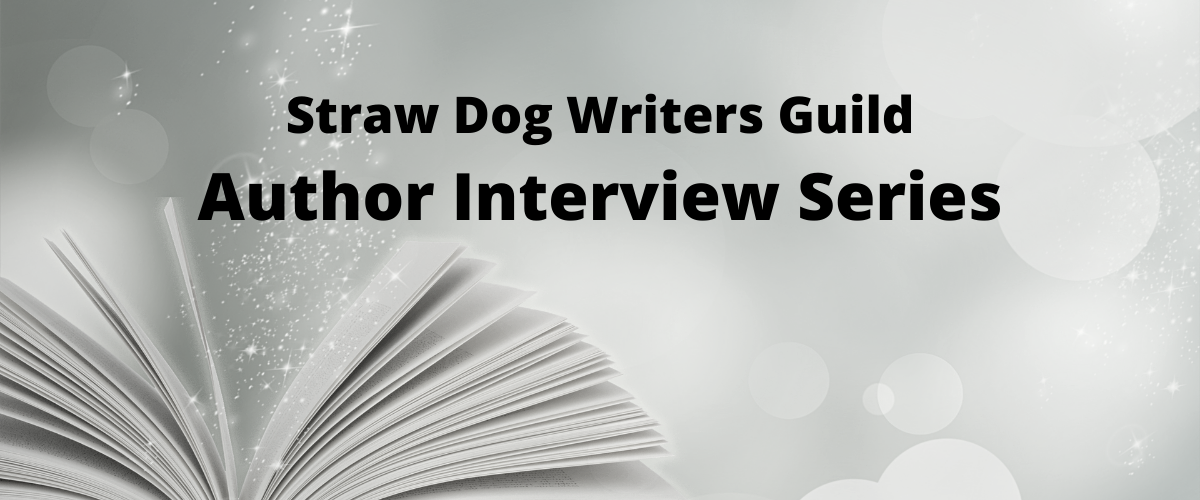 Adin Thayer is the author of The Close World, a collection of poems published by Tebot Bach, which won the Patricia Bibby First Book Award in 2021. In her review, Ellen Dore Watson called The Close World “...a prayer toward co-existence between self and other, past and present, the natural and the made world.” The book is divided into three sections, each of which focuses on an important aspect of Adin’s life. Part 1 examines her time working in Rwanda and Congo after the upheaval and genocide of the 1990s. Part 2 reflects on her childhood in segregated Virginia in the 1950s. In part 3 she turns her attention to the healing and sustaining power of the natural world. Adin was the featured reader in the February 2022 edition of Straw Dog Writers Guild’s Writers Night Out.
Adin Thayer is the author of The Close World, a collection of poems published by Tebot Bach, which won the Patricia Bibby First Book Award in 2021. In her review, Ellen Dore Watson called The Close World “...a prayer toward co-existence between self and other, past and present, the natural and the made world.” The book is divided into three sections, each of which focuses on an important aspect of Adin’s life. Part 1 examines her time working in Rwanda and Congo after the upheaval and genocide of the 1990s. Part 2 reflects on her childhood in segregated Virginia in the 1950s. In part 3 she turns her attention to the healing and sustaining power of the natural world. Adin was the featured reader in the February 2022 edition of Straw Dog Writers Guild’s Writers Night Out.
SDWG: The structure of The Close World is based on a thematic progression. Can you tell us a little about the themes which predominate the poems of each section – as you see them – and then how the sections weave together into a thematic whole?
AT: The poems I wrote about experiences and people I encountered in Rwanda, Congo and Burundi were ones I felt obligated to try to share with other people, because they described a human capacity for healing and transcendence that most people may not know prevails in countries still struggling with both past and present violence. I felt they needed to stand on their own, and come before the life experiences that underlay my decision to go there.
Those life experiences centered around a childhood in which injustice and violence based on race was everywhere around me, and yet as a child, I didn’t see it. I will never understand how my parents could have raised five daughters without bringing this into our awareness. The shame and guilt I felt as I came to see that system affected me much more than I realized, and was the force that pushed me to Africa. Only later did I come to see that I had gone there because I was afraid of working, in my own life and world, on the continuing racial injustice in which I was directly implicated. Once I realized that, I began to do anti-racism work in the South.
The third section of the book I see as concerned more with the neverending presence of the natural world and the sustenance it provides to me. The section also contains a few more philosophical poems, and/or ones written to other poets whom I carry inside me. Basically poems that didn’t belong in the other two sections but seemed to belong to the book.
SDWG: In addition to the three areas of your life that The Close World focuses on, you’ve noted your family as a big source of poetic energy: your mother, your children, and grandchildren, even though they aren’t direct subjects in your book. Do you find yourself writing because of them? Perhaps writing for them, or to them in other ways?
AT: What an interesting question, and one I have to think about. I certainly write a lot of “occasional” poems (birthdays, etc.) for members of my family, but have shied away from writing much about my own daughters. As time goes on, I find my mother to be a subject that never ends, as I find myself growing more and more like her. She too was a poet. She too lived alone and loved more than anything to be among trees in the woods. We struggled when she was alive, but my relationship with her internally grows deep and rich. And my grandchildren inspire me to write. Although I think the poems are about them, they end up often taking the form of something I am saying to them, and I see that the poems are really about me, or the magic I feel is present at the beginning of life that they kindle in me.
SDWG: You give a lot of credit for your development as a poet to the writers group to which you belong. The group has been meeting together for a fairly long time and it’s not an “official” organization or tied to any school or institution. Can you say a little about the group and how and why that relationship has worked so well for you?
AT: We are a group of five women of different ages and who live different lives. Right from the start, I felt, and I think we all did, that the responses we had to each other’s poems enriched them. When my book was accepted for publication I knew clearly that I would not have become the poet who wrote it without their feedback. We have distinct ways of responding. For instance, Sharon often wants to remove the endings from my poems. And, remarkably, I don’t feel a shred of defensiveness from any of us, which to me indicates we both trust and respect each other and each other’s work, in a deep way. In addition, we really like each other as people and get along really well. We laugh a lot.
SDWG: You’ve said you are as much a reader as a writer. I suspect that many writers would apply the same description to themselves, but can you explain a little about how that works in your case, especially how it informs your practice and process as a poet?
AT: I begin almost every day reading poetry. More often than not it is a line or phrase in a poem I’m reading that leads me toward one I try to write. Though I’m not a particularly deep reader, there are a few poets that feel like they actually accompany me in life, because they have described states of being that are so deeply specific and personal, that I recognize a lot of fellow-feeling. They keep me company. I read a lot of other things too: fiction and nonfiction, and now and then something in one of those books, maybe new information, about birds or trees or politics, will lead me toward a poem.
SDWG: These poets to whom you find yourself returning faithfully over time – how do you think they’ve been able to convey these “states of being” in their work? Can you describe how they have influenced your own work?
AT: William Stafford was the first poet I remember carrying around inside me as a friend, then Jane Hirschfield and Eavan Boland. In my experience when a poet really speaks to something inside me, I find their way of writing sometimes influences mine, as though the voice I am reading could become a part of my own. And I think that happens as I write, when I am reading someone for a while, like with musicians. Also W.S. Merwin and Charles Wright, Robert Frost: poets who are passionate about the natural world. And the place of honor will always be held for Emily Dickinson.
SDWG: Conversely, are there poets whose work you find yourself writing in contrast ? I don’t mean this to suggest that you dislike them or find their work distasteful, but rather that you may have moved beyond their work as an influence, or have decided to set yourself apart from their influence? If this is true, could you give us an example?
AT: Louise Gluck is a good example for me. I am stunned sometimes by the beauty and honesty of her language, but I find I react against her harsh analysis of her family, and the chilly winds that blow through her writing. I also have a strong wish to communicate through my writing with non-poets, so poetry which I can’t understand, try as I might, I tend to stay away from.
SDWG: Earlier we were discussing the fundamental and essential power of honesty in poetry, as well as the boundaries of that honesty for you: that there is territory in which you don’t or can’t justifiably “mine” for the content of your poems, at least as a writer who is writing to be read. Can you describe where you think some of those boundaries lie and why?
AT: Primarily the people whom I love: sisters, children, friends. I can write about them to celebrate occasions, but deep relationships are private, and for me, so far anyway, it feels like an invasion of privacy to include those depths on the page. In general I think I steer clear of the subject of love, other than for my grandchildren and for the given world.
SDWG: We were also talking about how your poems “turn” from the concrete, or the “here and now” to a consideration of the moment as a piece or representation of something larger; universal or spiritual, perhaps. It must be a magical moment for you as a poet, when you feel the poem starting to take that turn. Can you explain a little about how it takes place? Is there a way that you’ve found of building it into the process of writing a poem?
AT: I love this question, and I think it might be about something that will always remain a mystery. As I write through the years, it does seem as though the practice of sitting patiently, like fishing, for words, invites them to rise from somewhere other than my ordinary consciousness. I have a little confidence that if a configuration of afternoon clouds strikes a desire to describe them, and I begin, they will evolve from the concrete on their own. And as lines appear on the page, they are the path for the next ones. And I truly do not know where they will lead. I know writers say that all the time, especially novelists, but in my case it’s absolutely true. I know I have an ongoing desire to be able to express my love for the natural world, and my anguish about the ways human beings abuse power and destroy each other, so sometimes clouds might lead to anguish because that is a well-worn path of association. I do look for a balance though, between dismay and awe, describing suffering for its own sake feels almost like expanding it.
SDWG: In our discussion about how poems close, you were saying that you like poems that end with a clear and articulated “Aha!”; a surprise or a deduction, if you will. Can you give an example from your own poems or another author’s poems that does this?
 AT: This is the last stanza of a small poem in my book, about my mother:
AT: This is the last stanza of a small poem in my book, about my mother:
It’s funny how a child hears
an instruction.
Pitch it out, she said,
as though she meant, never let me go.
SDWG: You also mentioned that some of your trusted writer-readers disagree with this affinity, and through their coaching you’ve learned to leave some things unsaid. Some of your own foundational poets (Dickinson, for example) might give us many examples which leave the moment of meaning to the reader. How do you manage this balance of exposition and suggestion?
AT: I trust their feedback so much, I often just offer the poem while saying: I know I’ll have to lose the last line, and I often do. I see my definite tendency toward those kinds of endings. To a degree I think they arrive as part of the process of writing the poem. I write pretty quickly, in a few minutes, in a sort of rush of movement from one place or space to another, and it seems to arrive at an end, and the end is often a surprise to me. So, often I keep the kick at the end.
SDWG: How are usage and form useful in creating this balance of accessibility? In other words, how do you manage the conventional or unconventional use of syntax and punctuation, as well as spacing and line breaks in order to keep or further this balance?
AT: This is another good question to ponder. I write almost always (unless the poem is an expression of some turbulence or confusion) in sentences or phrases which fit together correctly, though sometimes in an order one wouldn’t use in speaking. Sometimes a poem is just one continuous sentence, but it is a real one. For quite a while I have gone light on punctuation and used space instead to indicate pauses or emphasis, I like the airy look this gives, and it feels more malleable. After a comma, two spaces. But what if I want a longer pause to build tension or feeling? Even with those spaces, the language is coherent. I definitely want a person who isn’t a poet to feel invited in.
SDWG: The Close World is your first book, and obviously well-received. You’ve mentioned that you didn’t really have a book in mind as you were writing the poems that eventually became one, and that publication isn’t really your primary objective as a poet. That said, what are you working on now? What is your poetic attention focused on? Do you have other kinds of projects in mind or in process? Where and when might we see more of your work?
AT: Again, thank you for this question. I don’t think in terms of projects at all. Poetry is a practice for me; of spirit, but also of knowing my inner self in a deeper way. The two themes that never depart are the same ones The Close World explores: The neverending beauty and generosity of the earth and its forests and mountains and animals; and the harm human beings cause each other in spite of all we’ve been given. So that seems to be what my writing is about, the way the beauty and lawfulness of the world offer me a home amidst all our human lawlessness.
 The Close World is available from Small Press Distribution: The Close World by Adin Thayer
The Close World is available from Small Press Distribution: The Close World by Adin Thayer
Broadside Books in Northampton: Broadside Books
And from Barnes and Noble: The Close World by Adin Thayer @ B&N
Adin reading from The Close World: Adin Thayer Presents The Close World
Passcode: Jfm&j61D
******************************************************
Interviewer: Mark Luebbers, Straw Dog Writers Guild member
Mark Luebbers is a teacher and writer living in Greenfield, Massachusetts. His work focuses on nature and the environment, the lives of eccentric and creative figures from history, and living in America. Mark has published poems in a number of journals and magazines in recent years, including The American Journal of Poetry, The Journal of Americana, Wayfarer Magazine, Apple Valley Review, Blue Line, and The Hopper. In 2018, Mark was nominated for two Pushcart Prizes. “Flat Light”, his first collection, was published in 2020 by Urban Farmhouse Press. “Citizens of Ordinary Time”, a collection of biographical and ekphrastic poems written in collaboration with Ben Goluboff, is forthcoming, also from UFP.

